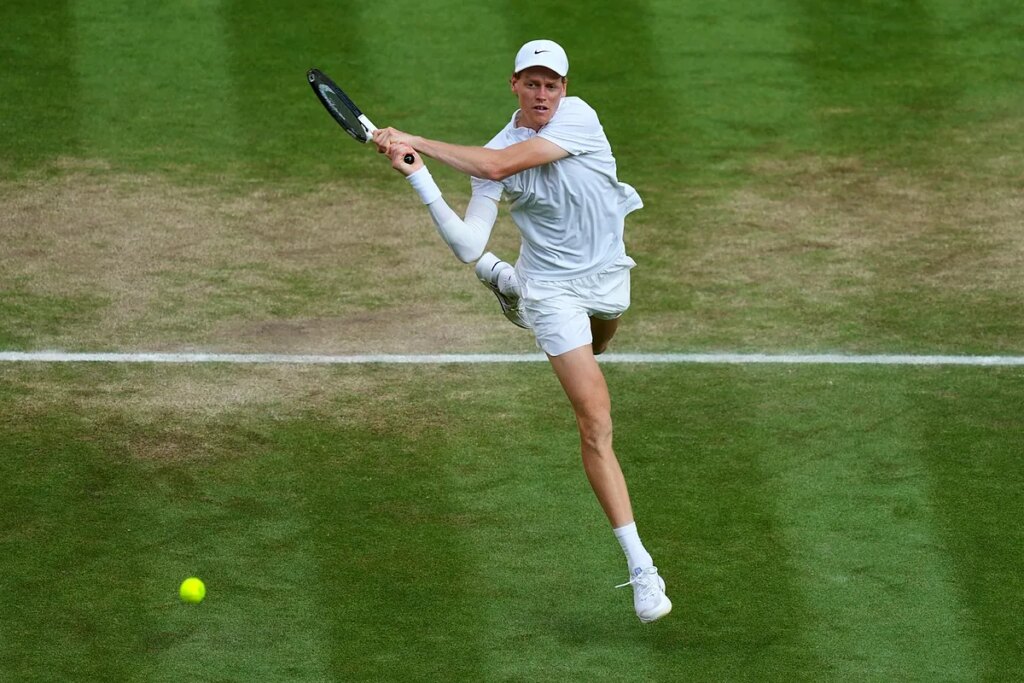Tennis star Jannik Sinner’s impressive victory at Wimbledon hasn’t come without some criticism due to his previous doping scandal.
While the 23-year-old Italian secured his second Grand Slam of the year by defeating Carlos Alcaraz in the men’s final, Australian tennis player Nick Kyrgios has raised doubts about the legitimacy of his triumph. Kyrgios has publicly criticized Sinner, questioning the integrity of his win and his doping case’s outcome, which continues to stir debate within the tennis world.
Sinner’s doping scandal emerged earlier in 2024 when he tested positive for clostebol, an anabolic steroid, during the Indian Wells tournament. The International Tennis Integrity Agency (ITIA) and Sinner both maintained that the positive test was a result of accidental contamination.
According to Sinner, his trainer, Giacomo Naldi, used a healing spray on his own cut, which allegedly contained the banned substance. When Naldi administered a massage to Sinner after using the spray, the substance was unknowingly transferred to Sinner’s system. Despite this explanation, the ITIA ruled that Sinner was not at fault or negligent, which allowed him to continue his career without a significant suspension.
However, the World Anti-Doping Agency (WADA) disagreed with the ITIA’s decision and appealed, arguing that Sinner’s entourage should be held responsible for the mishap. After months of legal wrangling, Sinner accepted a three-month suspension, running from February 9 to May 4, 2025.
Interestingly, this suspension did not affect any Grand Slam tournaments, as it allowed Sinner to play in the French Open. This lenient penalty raised eyebrows and prompted criticism from several figures in the tennis community.
Kyrgios’ outspoken reaction
Nick Kyrgios has been one of the most vocal critics of Sinner’s case. The Australian tennis star took to social media to express his dissatisfaction with how the situation was handled, as he posted as asterisk on social media following Sinner’s win at Wimbledon.
Prior to that he described the doping controversy as “disgusting” for the sport, citing the fact that two world No. 1 players-Sinner and Iga Swiatek-had been involved in doping incidents.
He emphasized that tennis integrity was at stake and lamented that many in the sport were avoiding a direct conversation about these issues.
Kyrgios also questioned Sinner’s explanation, pointing out that the Italian did not sever ties with his trainer immediately after the contamination occurred. “If my physiotherapist contaminated me, I would probably never talk to the guy again,” Kyrgios said. “Why did Sinner keep him around for five months?”
He also made it clear that he would never resort to doping, despite the temptations some athletes face during recovery from injury. According to Kyrgios, players who engage in such practices dishonor the sport by not relying solely on their natural talent.
Sinner’s response and the bigger debate
While Kyrgios has made his position clear, Sinner has maintained that his actions were unintentional and that he has been unfairly criticized. The Italian has focused on his game, ignoring the external distractions, and has stated that he will not engage with those who question his integrity.
As the controversy persists, it raises important questions about the consistency and fairness of anti-doping regulations in tennis.
The ongoing debate surrounding Jannik Sinner’s doping case highlights the challenges tennis faces in ensuring fairness and transparency in its anti-doping policies. While Sinner’s victory at Wimbledon was a significant achievement, it will do little to quell those who continue to question the integrity of the Italiana and the game of tennis itself
As the tennis world continues to grapple with these issues, the focus must remain on safeguarding the sport’s reputation and maintaining a level playing field for all players.
Read the full article here

